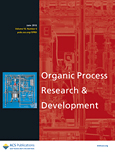
ORGANIC PROCESS RESEARCH & DEVELOPMENT
Scope & Guideline
Advancing Organic Chemistry for a Sustainable Future
Introduction
Aims and Scopes
- Process Development and Optimization:
The journal emphasizes advancements in synthetic methodologies, particularly those that streamline processes for the manufacture of pharmaceutical compounds and other organic materials, ensuring they are scalable and efficient. - Sustainable and Green Chemistry:
A consistent theme within the journal is the promotion of environmentally friendly practices in chemical synthesis, including the use of green solvents, renewable feedstocks, and minimizing waste in processes. - Catalysis and Reaction Engineering:
The journal showcases research on innovative catalytic systems, including non-precious metal catalysis and biocatalysis, aimed at improving reaction efficiency and selectivity in organic synthesis. - Analytical Methods and Process Safety:
Research published often includes the development of new analytical techniques for real-time monitoring of reactions and safety assessments to mitigate risks associated with chemical processes. - Continuous Flow Chemistry:
A significant focus is placed on continuous flow methodologies, which offer advantages in reaction control, safety, and scalability over traditional batch processes. - Impurity Control and Risk Assessment:
The journal addresses the critical aspects of impurity profiling and the development of strategies for managing and mitigating risks associated with pharmaceutical manufacturing.
Trending and Emerging
- Machine Learning and Data-Driven Approaches:
Recent publications increasingly incorporate machine learning techniques for optimizing processes, predicting outcomes, and enhancing reaction conditions, indicating a trend towards more data-driven methodologies in organic synthesis. - Biocatalysis and Enzyme Engineering:
There is a growing interest in the application of biocatalysis and enzyme engineering for more selective and environmentally friendly synthesis, reflecting a shift towards sustainable chemistry. - Process Analytical Technology (PAT):
The integration of PAT into synthetic processes is becoming more prominent, as researchers focus on real-time monitoring and control of chemical reactions to enhance process understanding and safety. - Sustainable Manufacturing Practices:
The journal emphasizes sustainable practices in synthesis, including the use of renewable resources and green chemistry techniques, in response to increasing regulatory and societal demands for environmentally responsible manufacturing. - Continuous Manufacturing Technologies:
The trend towards continuous manufacturing has accelerated, with numerous publications focusing on the development and optimization of continuous flow processes, highlighting their advantages in efficiency and scalability.
Declining or Waning
- Traditional Batch Processes:
There has been a noticeable decrease in publications related to conventional batch processes as the industry increasingly favors continuous and automated manufacturing techniques for efficiency and scalability. - Non-Precious Metal Catalysis:
Despite earlier emphasis on non-precious metal catalysis, recent trends show a waning interest, possibly due to the resurgence of interest in more established precious metal catalysts that offer higher selectivity and efficiency in complex reactions. - General Reviews and Overviews:
The frequency of general reviews that do not focus on specific advancements or case studies has decreased, as the journal appears to prioritize original research that presents novel methodologies and substantial contributions to process chemistry. - Medicinal Chemistry Focus:
There has been a shift away from purely medicinal chemistry topics toward more process-oriented research, reflecting a broader industry trend toward integrating chemistry with manufacturing and sustainability.
Similar Journals
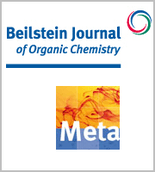
Beilstein Journal of Organic Chemistry
Advancing the frontiers of organic chemistry research.The Beilstein Journal of Organic Chemistry, published by the renowned BEILSTEIN-INSTITUT, stands as a pivotal platform for advancing the field of organic chemistry since its inception in 2005. With its commitment to Open Access publishing, this journal enables global readership and collaboration, fostering the dissemination of high-quality research. Operating from Germany, the journal has carved out a significant reputation, currently holding a Q2 ranking in the Organic Chemistry category, with impressive Scopus rankings placing it at #91 out of 211 in the field, achieving a 57th percentile. The Beilstein Journal is dedicated to publishing cutting-edge findings that span the breadth of organic chemistry, including synthetic methodologies, catalysis, and material sciences, making it an essential resource for researchers, professionals, and students looking to stay at the forefront of organic chemistry advancements. With a vision to enhance collaboration and knowledge sharing within the scientific community, the journal plays a vital role in shaping the future of organic chemistry research.
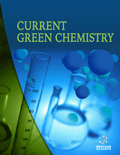
Current Green Chemistry
Pioneering research in the realm of green chemistry.Current Green Chemistry, published by Bentham Science Publishers, is a pivotal scholarly resource devoted to advancing the field of green chemistry. With ISSN 2213-3461 and E-ISSN 2213-347X, this journal serves as a crucial platform for researchers and professionals to explore innovative and sustainable practices within the chemical sciences. The journal has demonstrated significant recognition, evidenced by its categorization in the third quartile (Q3) across various specializations including Analytical Chemistry and Inorganic Chemistry, and even a fourth quartile (Q4) in Organic Chemistry, according to the latest Scopus metrics. This indicates a growing influence in relevant fields, making it a valuable reference for contemporary environmental initiatives. The journal's accessible nature, although not open access, ensures researchers can still engage with high-quality, peer-reviewed content. Spanning an impressive converged period from 2019 to 2024, Current Green Chemistry is committed to enhancing the visibility of groundbreaking research that aligns with sustainable development objectives, making it an essential resource for anyone interested in the future of chemistry.
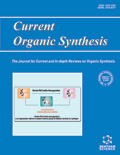
CURRENT ORGANIC SYNTHESIS
Bridging Theory and Practice in Organic SynthesisCURRENT ORGANIC SYNTHESIS, published by Bentham Science Publishers Ltd, is a leading journal in the field of organic chemistry and biochemistry that serves as a vital platform for researchers and professionals advancing the synthesis of organic compounds. With an ISSN of 1570-1794 and an E-ISSN of 1875-6271, it boasts a significant impact within its category, ranked in the Q3 quartile for both biochemistry and organic chemistry as of 2023. The journal covers innovative research and reviews that enhance our understanding of organic synthesis methodologies, showcasing contributions that advance the field. Operating from Sharjah, United Arab Emirates, CURRENT ORGANIC SYNTHESIS has evolved since its inception in 2005, providing access to a wealth of information essential for students, professionals, and researchers alike. While it currently does not offer open access, the journal continues to maintain a strong community of scholars dedicated to fostering dialogue and innovation in the organic sciences.

Green Synthesis and Catalysis
Empowering Green Solutions for a Better TomorrowGreen Synthesis and Catalysis is a pioneering Open Access journal dedicated to advancing the fields of biotechnology and catalysis, published by KEAI PUBLISHING LTD since 2020. With an impressive Q1 ranking in both Biotechnology and Catalysis and notable Scopus rankings placing it in the top echelons of its categories, this journal serves as a critical platform for researchers and professionals dedicated to innovative and sustainable chemical practices. The journal addresses the pressing need for environmentally-friendly synthesis methods and efficient catalytic processes that align with global sustainability goals. Based in Beijing, China, it offers a wealth of peer-reviewed articles, reviews, and cutting-edge research focusing on green technologies and practices. Academics and practitioners alike can benefit from the journal's wide-ranging scope that promises to push the boundaries of current scientific understanding and application. Engage with the latest discoveries by accessing the journal’s enriching content online, and contribute to the transformative dialogue surrounding sustainable synthesis and catalytic innovation.

Nature Reviews Chemistry
Connecting Scholars with the Pulse of Chemical InnovationNature Reviews Chemistry is a premier journal published by NATURE PORTFOLIO, dedicated to advancing scholarly discourse in the broad field of chemistry. With an impressive impact factor and a ranking in the 99th percentile across its categories—ranked #2 in General Chemical Engineering and #4 in General Chemistry according to Scopus—this journal is recognized for its high-quality, peer-reviewed articles that synthesize and analyze the latest advancements in chemical research. Operating under a convergence framework from 2017 to 2024, Nature Reviews Chemistry aims to provide comprehensive insights and critical examinations of contemporary chemical practices, thereby reinforcing its status as a vital resource for researchers, professionals, and students alike. Although it is not an open-access journal, the breadth and authority of its content make it essential for those looking to stay at the forefront of chemical sciences.

CHINESE JOURNAL OF ORGANIC CHEMISTRY
Elevating Research Standards in Organic ChemistryThe Chinese Journal of Organic Chemistry, published by Science Press, serves as a pivotal platform for advancing the field of organic chemistry since its inception in 1996. With an ISSN of 0253-2786, this esteemed journal provides robust scientific contributions, reflecting significant advancements and novel findings that are crucial to the organic chemistry community. As of 2023, it is categorized in the Q3 quartile of organic chemistry journals, positioning it within the competitive landscape of this vibrant research area, ranking #147 out of 211 in Scopus, corresponding to a 30th percentile ranking. The journal is committed to fostering a scholarly exchange of ideas and research, making it an essential resource for researchers, professionals, and students dedicated to exploring the complexities and applications of organic compounds. The Chinese Journal of Organic Chemistry continues to support the dissemination of high-quality research that contributes to both local and global scientific endeavors.

Journal of Siberian Federal University-Chemistry
Connecting Scholars in the Evolving Landscape of Chemistry.Journal of Siberian Federal University-Chemistry is a peer-reviewed academic journal dedicated to advancing the field of chemistry through the dissemination of original research, review articles, and innovative studies. Published by Siberian Federal University, this journal provides a platform for scholars in the Russian Federation and beyond to showcase their work in an ever-evolving scientific landscape. With an ISSN of 1998-2836 and an E-ISSN of 2313-6049, the journal is indexed in Scopus, currently ranked in the Q4 category for both Chemical Engineering and Chemistry, highlighting its emerging presence in these fields. The journal aims to foster collaboration and knowledge exchange among researchers, professionals, and students, thus contributing to the broader goals of scientific advancement. Although the journal operates under standard access conditions, its high-quality and diverse content ensures that it remains a valuable resource for those engaged in chemical research. In an era where interdisciplinary approaches are increasingly vital, the Journal of Siberian Federal University-Chemistry plays an important role by integrating various aspects of chemistry with related fields.

JACS Au
Connecting researchers to the pulse of cutting-edge chemistry.JACS Au, published by the American Chemical Society, is a premier open access journal dedicated to advancing research in the rapidly evolving fields of analytical chemistry, organic chemistry, and theoretical chemistry. Since its inception in 2021, JACS Au has quickly established itself as a leading platform for high-quality research, reflected in its Q1 rankings across multiple categories for 2023, including Organic Chemistry and Analytical Chemistry. The journal focuses on innovative methodologies and applications that drive the discipline forward, making it an essential resource for researchers, professionals, and students alike. With an impressive Scopus ranking, consistently placing in the top tiers of its categories, and offering a broad range of access options for its readership, JACS Au aims to foster collaboration and disseminate transformative ideas that impact the global scientific community. Exploring diverse topics within chemistry, this journal provides a vital conduit for sharing groundbreaking research and enhancing scientific dialogue.
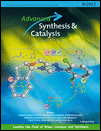
ADVANCED SYNTHESIS & CATALYSIS
Empowering researchers to transform chemical processes.ADVANCED SYNTHESIS & CATALYSIS is a prestigious academic journal published by Wiley-VCH Verlag GmbH, based in Germany. This journal, with ISSN 1615-4150 and E-ISSN 1615-4169, plays a pivotal role in the fields of Chemistry and Chemical Engineering, earning commendable rankings such as Q2 in Catalysis and Q1 in Organic Chemistry in 2023. Its high impact factor and recognition—ranking #18 in both Organic Chemistry and Catalysis—further underscore its significance as a platform for groundbreaking research and innovative methodologies. Spanning from 1996 through 2024, ADVANCED SYNTHESIS & CATALYSIS aims to disseminate high-quality, cutting-edge studies related to synthetic processes and catalytic technologies, ensuring accessibility via their open access options. By fostering a vibrant scholarly community, this journal serves as an essential resource for researchers, professionals, and students dedicated to driving advancements in synthetic and catalytic chemistry.
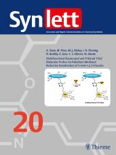
SYNLETT
Connecting Ideas and Innovations in Organic SynthesisSYNLETT is a prominent academic journal dedicated to the field of Organic Chemistry, published by GEORG THIEME VERLAG KG. Since its inception in 1989, the journal has played a critical role in advancing the understanding of synthetic methodologies and organic compounds, offering a platform for innovative research and discoveries. With an ISSN of 0936-5214 and an E-ISSN of 1437-2096, SYNLETT is well-regarded in the academic community, presently positioned in the Q3 quartile for Organic Chemistry according to the 2023 category rankings. The journal is particularly valuable for researchers and professionals seeking insights into contemporary organic synthesis methods and their applications. Although it does not operate under an Open Access model, it remains a crucial resource within the field, contributing to significant advancements and collaborations globally. For those engaged in organic synthesis, SYNLETT not only encapsulates cutting-edge research but also inspires innovation in the discipline.